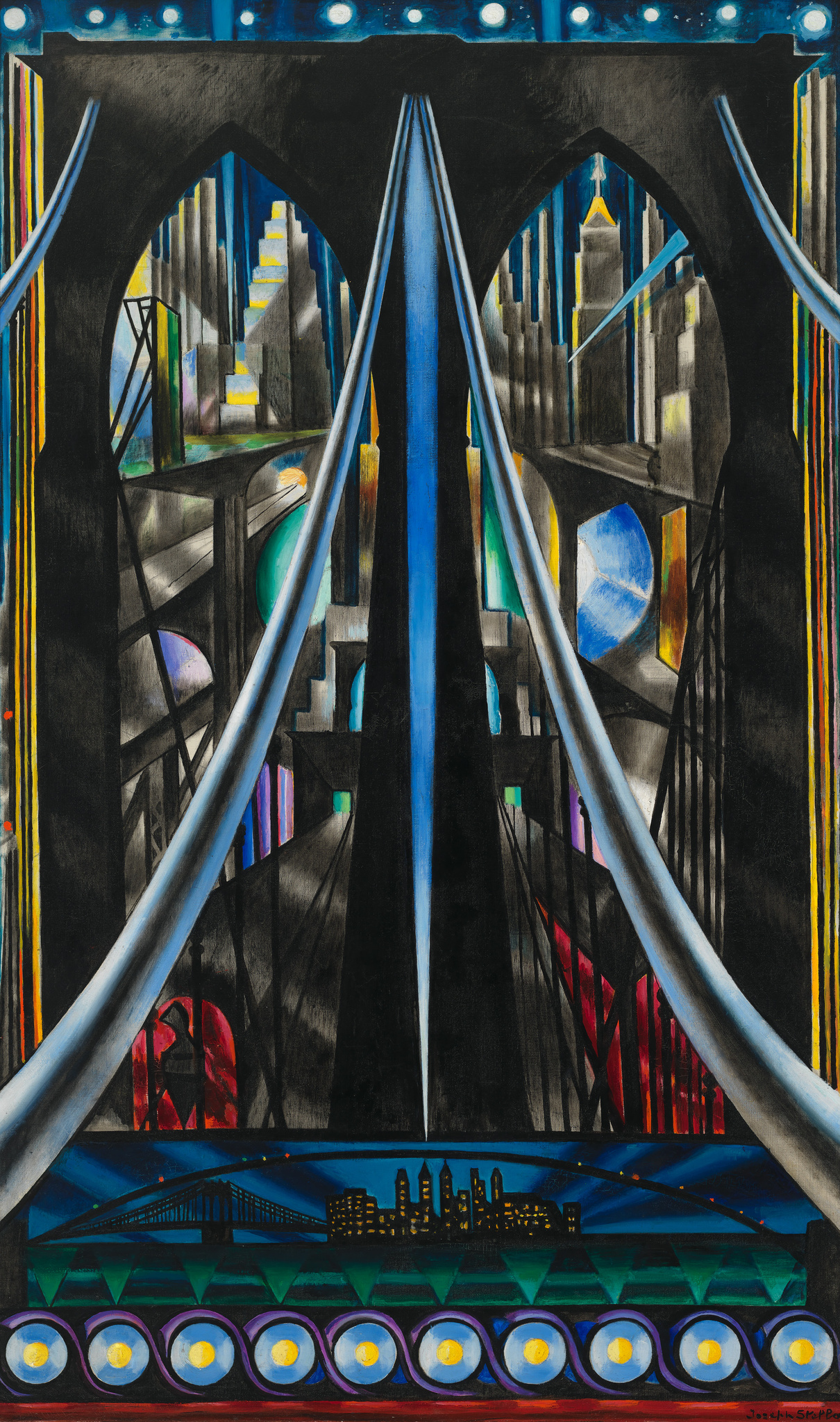TO BROOKLYN BRIDGE
By:
August 10, 2025
A series dedicated to poems, published c. 1900–1935, the Radium Age sf-adjacent themes of which include: dystopia and utopia, far-out mathematics and the fourth dimension, Afro-futurism, catastrophe, future war, new technologies, scientific breakthrough, dehumanization, cosmic awe, disenchantment and unseen forces, unknowable aliens and singularity. Research and selection by Joshua Glenn; thematic index here.

How many dawns, chill from his rippling
rest
The seagull’s wings shall dip and pivot him,
Shedding white rings of tumult, building
high
Over the chained bay waters Liberty —
Then, with inviolate curve, forsake our eyes
As apparitional as sails that cross
Some page of figures to be filed away;
— Till elevators drop us from our day…
I think of cinemas, panoramic sleights
With multitudes bent toward some flashing
scene
Never disclosed, but hastened to again,
Foretold to other eyes on the same screen;
And Thee, across the harbor, silver-paced
As though the sun took step of thee, yet
left
Some motion ever unspent in thy stride, —
Implicitly thy freedom staying thee!
Out of some subway scuttle, cell or loft
A bedlamite speeds to thy parapets,
Tilting there momently, shrill shirt
ballooning,
A jest falls from the speechless caravan.
Down Wall, from girder into street noon
leaks,
A rip-tooth of the sky’s acetylene;
All afternoon the cloud-flown derricks
turn…
Thy cables breathe the North Atlantic still.
And obscure as that heaven of the Jews,
Thy guerdon … Accolade thou dost bestow
Of anonymity time cannot raise:
Vibrant reprieve and pardon thou dost
show.
O harp and altar, of the fury fused,
(How could mere toil align thy choiring
strings!)
Terrific threshold of the prophet’s pledge,
Prayer of pariah, and the lover’s cry,—
Again the traffic lights that skim thy swift
Unfractioned idiom, immaculate sigh of
stars,
Beading thy path — condense eternity:
And we have seen night lifted in thine
arms.
Under thy shadow by the piers I waited;
Only in darkness is thy shadow clear.
The City’s fiery parcels all undone,
Already snow submerges an iron year…
O Sleepless as the river under thee,
Vaulting the sea, the prairies’ dreaming
sod,
Unto us lowliest sometime sweep, descend
And of the curveship lend a myth to God.
— This “proem” precedes the eight sections of Crane’s The Bridge, first published in 1930 by the Black Sun Press. The Bridge‘s status as either an epic or a series of fifteen lyrical poems remains contested; recent criticism tends to read it as a hybrid, perhaps indicative of a new genre, the “modernist epic.”
The University of Illinois’ Modern American Poetry website analyzes the symbolic meaning of “the bridge” as central image throughout the book:
When Crane positions himself under the shadows of the bridge, he is, in one sense, simply the poet of the romantic tradition, the observer who stands aside the better to see; but he is, in another sense, the gay male cruising in an area notorious for its casual sex. Even the bridge itself, the Brooklyn Bridge that is the central object of the poem, was strongly identified in Crane’s own mind with [Crane’s lover] Emil Opffer, to whom Voyages was dedicated. The appearance of the bridge secretly encrypts a highly personal memory and a specific presence in the text. Crane’s “epic of America” gets underway as a personal quest, as a poem divided against itself, in devotion to an urban setting that encourages social diversity, with secret inscriptions that retain their meanings to which only a privileged few are accessible.
Elsewhere in this long poem, references to “Tintex—Japalac—Certain-teed Overalls ads” and “telepathy of wires,” reflect the industrialized, media-saturated culture of the 1920s.
RADIUM AGE PROTO-SF POETRY: Stephen Spender’s THE PYLONS | George Sterling’s THE TESTIMONY OF THE SUNS | Archibald MacLeish’s EINSTEIN | Thomas Thornely’s THE ATOM | C.S. Lewis’s DYMER | Stephen Vincent Benét’s METROPOLITAN NIGHTMARE | Robert Frost’s FIRE AND ICE | Aldous Huxley’s FIFTH PHILOSOPHER’S SONG | Sara Teasdale’s “THERE WILL COME SOFT RAINS” | Edith Södergran’s ON FOOT I HAD TO… | Robert Graves’s WELSH INCIDENT | Nancy Cunard’s ZEPPELINS | D.H. Lawrence’s WELLSIAN FUTURES | & many more.
